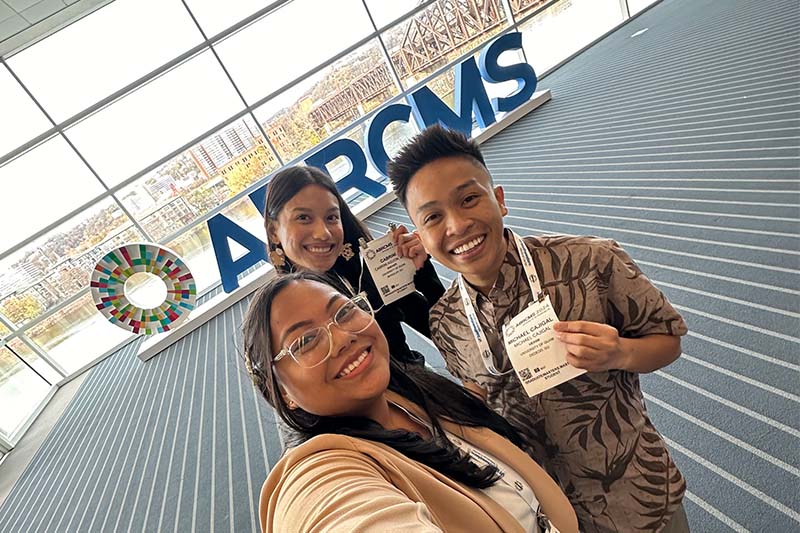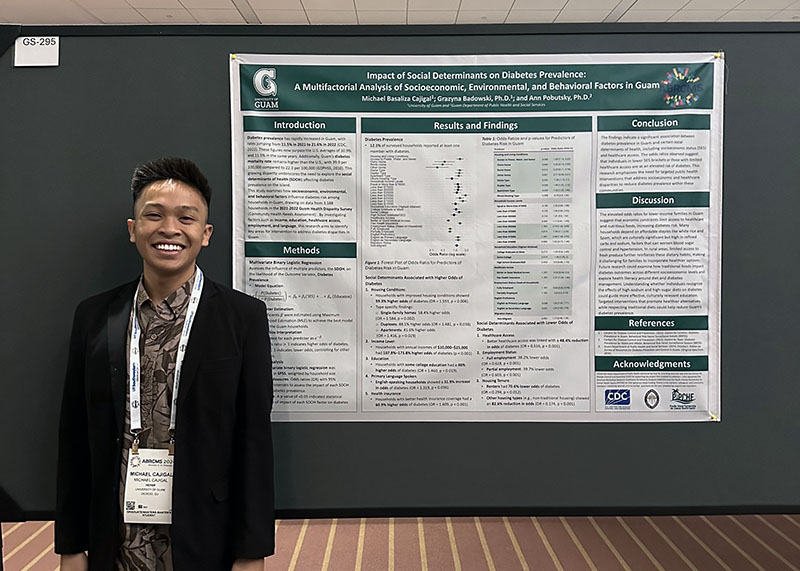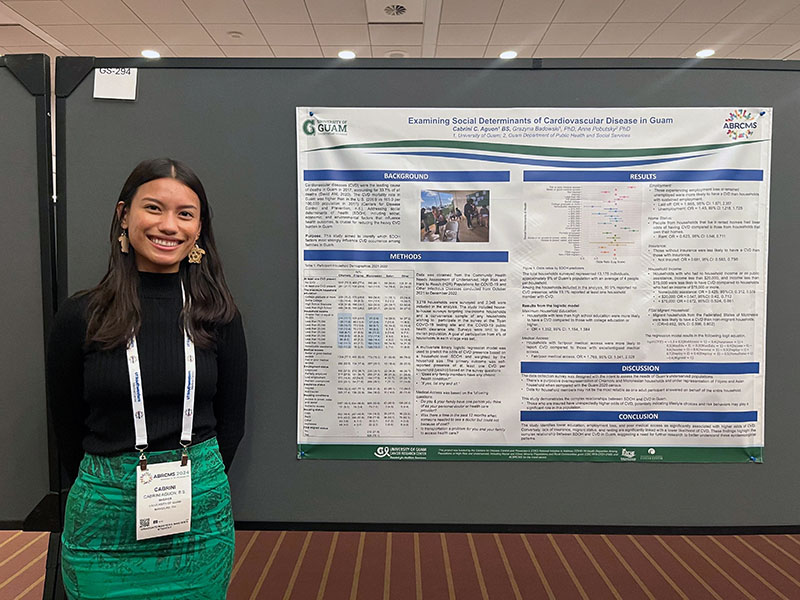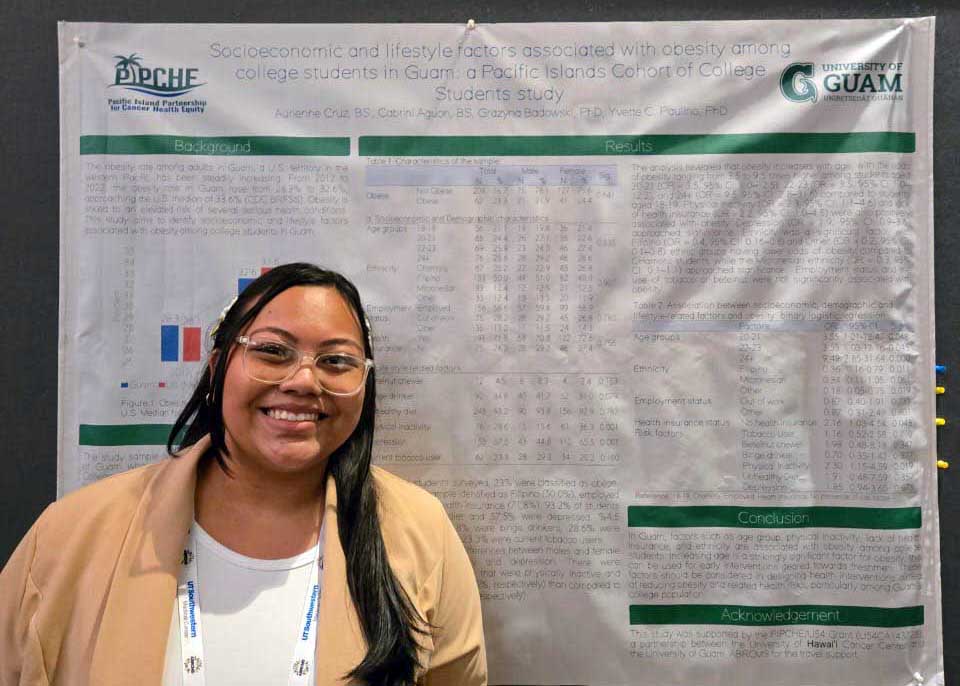Data science students analyze Guam health data and present findings at biomedical research conference
Data science students analyze Guam health data and present findings at biomedical research conference
Data science students analyze Guam health data and present findings at biomedical research conference
1/7/2025

Three graduate students from the University of Guam’s new M.S. in Data Science Program were able to share their research findings with a national audience after being accepted to present at the 2024 Annual Biomedical Research Conference for Minoritized Scientists in Pittsburgh in November.
The conference organizers define it as the go-to conference for historically excluded communities in science, technology, engineering, and math. It aims to engage researchers from a wide variety of backgrounds, cultures, and experiences in order to strengthen human capacity to address complex scientific problems.
|
|
“It is a great accomplishment for the first-year data science graduate students from the newly established M.S. Data Science program to be recognized at ABRCMS,” said Dr. Grazyna Badowski, chair of the M.S. in Data Science program and mentor to the three students. “Their success not only highlights the significance of addressing health disparities in Guam, but also demonstrates the growing data science capacity at the University of Guam.”
Michael Cajigal and Cabrini Aguon conducted related research projects based on a data from a Community Health Needs Assessment funded by the Centers for Disease Control & Prevention that they previously assisted with as research assistants. The survey was specific to underserved, high-risk, and hard-to-reach populations. Using the data, Cajigal researched the social determinants of diabetes prevalence in Guam, while Aguon looked into social determinants of developing cardiovascular disease — both chronic diseases in which the mortality rate in Guam exceeds that in the United States. They found that socioeconomic factors, including income, education, and health care access, play a critical role.
“The most rewarding aspect of this project was uncovering actionable insights to guide health policies aimed at reducing disparities in Guam,” Cajigal said. “Sharing these results at a national conference was a highlight, as it allowed me to engage with peers, receive, constructive feedback, and connect with students who share a similar aspiration — helping people.”

Aurienne Cruz presented her research on socioeconomic and lifestyle-related factors associated with obesity among Pacific Islander college students. She found that students over the age of 20 were three to nine times more likely to be at risk for obesity. She found correlations in physical inactivity, lack of health insurance, and ethnic background — with CHamoru students more at risk than Filipino and other ethnicities. She said she hopes her study can inform initiatives to address obesity among college students, particularly freshmen.
All three students received competitive travel awards to attend and present at the conference, which Badowski said speaks to the importance of their research contributions.

Through the Data Science master’s program, launched in May 2024, the University of Guam is looking to build a robust data science workforce for Guam and to advance data-driven solutions to Guam’s challenges.
In the inaugural cohort of the program, the master’s students said they have learned a lot so far in their first semester. They have learned to apply statistical tests based on their research questions and also gained proficiency in statistical software programs, like R Studio and SAS, enhancing their ability to manage, analyze, and interpret large datasets. Additionally, they said they have gained communications skills — both in communicating their research and in collaborating with others.

In their future careers, each hopes to continue assessing health data for the benefit of Guam's population. Cajigal is interested in developing culturally tailored interventions to address how traditional diets and food systems influence chronic disease outcomes.
“I am eager to continue researching Guam’s population, exploring various aspects that impact health, education, and quality of life to drive meaningful change,” Cruz said.
As for Aguon, she said she hopes to use machine learning techniques and A.I. to analyze cancer imaging and improve cancer outcomes for Guam's population.
Interested in Data Science?
Students interested in the M.S. Data Science program can review the program requirements in the UOG Graduate Bulletin or reach out to Program Chair Dr. Grazyna Badowski for more information at (671) 735-2840 or gbadowski@triton.uog.edu.
